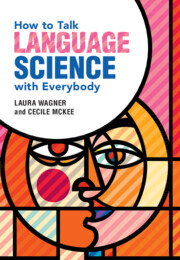Book contents
- How to Talk Language Science with Everybody
- How to Talk Language Science with Everybody
- Copyright page
- Contents
- Figures
- Preface
- Acknowledgments
- 1 Why Bother?
- 2 You Can Be the Expert
- 3 Cooperative Conversations
- 4 Conversational Goals
- 5 Know Your Audience
- 6 Creating Relevance by Generating Interest
- 7 Creating Relevance by Making Connections
- 8 Quality and Credibility
- 9 Quality vs Quantity
- 10 Learn to Listen
- 11 Information Structure
- 12 The Curse of Knowledge
- 13 Start with Examples
- 14 What’s New?
- 15 From Given to New
- 16 The Three-Legged Stool Approach
- 17 Working with a Range of Different Audiences
- 18 Where Can I Go?
- 19 Being a Good Partner
- 20 Finale
- Appendix Teaching with This Book
- References
- Index
2 - You Can Be the Expert
Published online by Cambridge University Press: 17 May 2023
- How to Talk Language Science with Everybody
- How to Talk Language Science with Everybody
- Copyright page
- Contents
- Figures
- Preface
- Acknowledgments
- 1 Why Bother?
- 2 You Can Be the Expert
- 3 Cooperative Conversations
- 4 Conversational Goals
- 5 Know Your Audience
- 6 Creating Relevance by Generating Interest
- 7 Creating Relevance by Making Connections
- 8 Quality and Credibility
- 9 Quality vs Quantity
- 10 Learn to Listen
- 11 Information Structure
- 12 The Curse of Knowledge
- 13 Start with Examples
- 14 What’s New?
- 15 From Given to New
- 16 The Three-Legged Stool Approach
- 17 Working with a Range of Different Audiences
- 18 Where Can I Go?
- 19 Being a Good Partner
- 20 Finale
- Appendix Teaching with This Book
- References
- Index
Summary
Chapter 2 opens by asking readers to reflect on strengths and weaknesses of experts of their choice and then to consider overlap between their own strengths and weaknesses and those of these experts. Variation in personalities and styles is useful in public engagement because we meet many different kinds of people in informal learning venues. The chapter thus encourages readers to be themselves as they talk about their science. Genuine passion combines well with any level of expertise. Further, saying "I don’t know" when you reach the edge of your expertise shows your conversational partners that you are honest. A demonstration of counting in different sign languages exemplifies these concepts. This chapter also encourages a growth mindset so that both success and failure during public engagement contribute to improved skills. This chapter’s Closing Worksheet asks readers to choose the topic area that they’ll develop into a demonstration through activities later in the book.
- Type
- Chapter
- Information
- How to Talk Language Science with Everybody , pp. 17 - 28Publisher: Cambridge University PressPrint publication year: 2023

